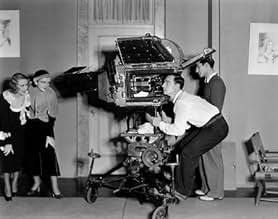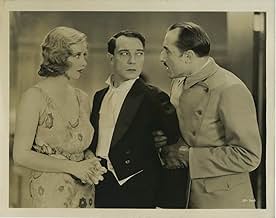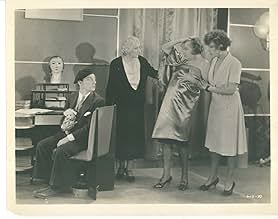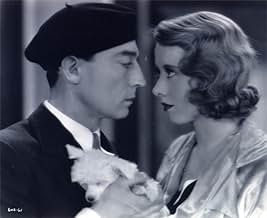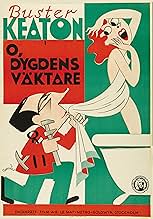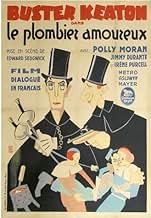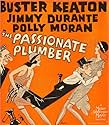अपनी भाषा में प्लॉट जोड़ेंTo make her lover jealous, a beautiful socialite passes off a bumbling plumber as her paramour.To make her lover jealous, a beautiful socialite passes off a bumbling plumber as her paramour.To make her lover jealous, a beautiful socialite passes off a bumbling plumber as her paramour.
- पुरस्कार
- कुल 4 जीत
Edward Brophy
- Man Outside Beauty Parlor
- (बिना क्रेडिट के)
Heinie Conklin
- Hunter with Rifle at Duel
- (बिना क्रेडिट के)
Carl M. Leviness
- Casino Patron
- (बिना क्रेडिट के)
Fred Malatesta
- Tony's Second
- (बिना क्रेडिट के)
Rolfe Sedan
- Tony's Second
- (बिना क्रेडिट के)
Stanhope Wheatcroft
- Casino Patron
- (बिना क्रेडिट के)
Florence Wix
- Casino Patron
- (बिना क्रेडिट के)
फ़ीचर्ड समीक्षाएं
This movie marks the darkest period for Buster Keaton and his fans. While the transition to sound for Keaton was very poor (after all, MGM studios tried to make this great mime a talking star), the PASSIONATE PLUMBER marks the beginning of the end of Keaton's career. That's because this was the first of three films that paired Keaton with Jimmy Durante--a "comedian" whose style was the exact opposite of Keaton's. Keaton's humor was physical and sweet, while Durante was extremely loud and overbearing and the two styles meshed like oil and water. It was obvious that the execs at MGM had no idea what to do with Keaton and pairing him with Durante was a sign that they had "jumped the shark"--in other words, they were trying desperate measures to try to salvage a career that had already peaked.
Now this isn't to say that Keaton couldn't have been funny. Had his films remained true to his strengths (physical humor and a general likability), he could have remained a viable star. Chaplin did this by refusing to immediately switch to sound films--making CITY LIGHTS (1931) and MODERN TIMES (1936) as silent movies even when everyone had switched to sound long before these films. It's really too bad that MGM didn't do what they did with Laurel and Hardy. This team did work for MGM technically speaking, but MGM allowed the affiliated Hal Roach Studio almost complete independence to do what they knew how to do best. Perhaps if Keaton had been sent to Roach, his sound career would have been a success. But with the gag writers at MGM, he was sunk.
This film is worse than his previous sound outings because Keaton is given almost no physical gags at all. The few that he does have are among the best moments in the film because they are genuine--gags that suit Keaton's style. But the rest of the film is so talky and forgettable that it will most likely make Keaton fans (like myself) wince. And, while I know some Durante fans might take offense, he came off as just obnoxious and annoying!
The film is called the PASSIONATE PLUMBER, though Keaton spends very little time plumbing. The beginning of the film involves more scenes with Durante and Keaton--while the last half of the film they don't appear in that many scenes together (thank goodness). During this phase of the film, Keaton mostly annoys those around him and is invited to a series of duels due to his incessant and annoying bumbling. For the remainder of the film, he tags along with a young woman as her aide. She has gotten him to promise never to leave her side because she's afraid she'll lose control and allow Gilbert Rolland to make love to her. So, through over half the film, you see Keaton essentially following her and that's all there is to the plot.
Sadly throughout all of this, there are almost no laughs at all--a serious problem with a comedy! Only at the very end, when it degenerates to slapstick, does the film show any promise--but then the final credits roll and you are left thinking "is that all there is?".
Now this isn't to say that Keaton couldn't have been funny. Had his films remained true to his strengths (physical humor and a general likability), he could have remained a viable star. Chaplin did this by refusing to immediately switch to sound films--making CITY LIGHTS (1931) and MODERN TIMES (1936) as silent movies even when everyone had switched to sound long before these films. It's really too bad that MGM didn't do what they did with Laurel and Hardy. This team did work for MGM technically speaking, but MGM allowed the affiliated Hal Roach Studio almost complete independence to do what they knew how to do best. Perhaps if Keaton had been sent to Roach, his sound career would have been a success. But with the gag writers at MGM, he was sunk.
This film is worse than his previous sound outings because Keaton is given almost no physical gags at all. The few that he does have are among the best moments in the film because they are genuine--gags that suit Keaton's style. But the rest of the film is so talky and forgettable that it will most likely make Keaton fans (like myself) wince. And, while I know some Durante fans might take offense, he came off as just obnoxious and annoying!
The film is called the PASSIONATE PLUMBER, though Keaton spends very little time plumbing. The beginning of the film involves more scenes with Durante and Keaton--while the last half of the film they don't appear in that many scenes together (thank goodness). During this phase of the film, Keaton mostly annoys those around him and is invited to a series of duels due to his incessant and annoying bumbling. For the remainder of the film, he tags along with a young woman as her aide. She has gotten him to promise never to leave her side because she's afraid she'll lose control and allow Gilbert Rolland to make love to her. So, through over half the film, you see Keaton essentially following her and that's all there is to the plot.
Sadly throughout all of this, there are almost no laughs at all--a serious problem with a comedy! Only at the very end, when it degenerates to slapstick, does the film show any promise--but then the final credits roll and you are left thinking "is that all there is?".
Not hilarious but pretty funny, with Jimmy Durante, Gilbert Roland and the three female leads of Moran, Maris and Purcell providing much of the comedy.
Weird and at times a little stupid, some good laughs; but the last reel is not as hilariously frantic as in other Keaton films.
Weird and at times a little stupid, some good laughs; but the last reel is not as hilariously frantic as in other Keaton films.
Out of all of Keaton's MGM sound films, The Passionate Plumber (1932) is the only one I actually laughed at. It's no riot, but it's The General (1926) compared to all that other garbage MGM forced upon Keaton in the 30s.
The story is very pre-code: Keaton plays an American plumber living in France. A socialite (Irene Purcell) discovers her lover (Gilbert Roland) is carrying on with another woman (Mona Maris), so she hires Keaton to make Roland jealous. Most of the movie concerns Keaton trying to keep her away from Roland, whom she simultaneously hates and lusts after.
Thank God above, Buster does not play an idiot! He's still socially awkward and a little lost, but his character is allowed to be clever, resourceful, and sarcastic. The physical comedy is actually inspired too, rather than tacked on (see the painfully bad slapstick during the check-in scene of Parlor, Bedroom, and Bath (1931)).
Much of the supporting cast is completely over the top and annoying. Irene Purcell and Mona Maris screech and howl. Jimmy Durante works best in small doses, which is luckily how he is here. Gilbert Roland works best when he isn't hamming it up to Mars, which unluckily, he does in a number of scenes.
Fortunately, the supporting cast, while not always pleasant, is not terrible enough to kill the movie. If you've lost all hope after Free and Easy (1930) and What! No Beer (1933), then give this one a try.
The story is very pre-code: Keaton plays an American plumber living in France. A socialite (Irene Purcell) discovers her lover (Gilbert Roland) is carrying on with another woman (Mona Maris), so she hires Keaton to make Roland jealous. Most of the movie concerns Keaton trying to keep her away from Roland, whom she simultaneously hates and lusts after.
Thank God above, Buster does not play an idiot! He's still socially awkward and a little lost, but his character is allowed to be clever, resourceful, and sarcastic. The physical comedy is actually inspired too, rather than tacked on (see the painfully bad slapstick during the check-in scene of Parlor, Bedroom, and Bath (1931)).
Much of the supporting cast is completely over the top and annoying. Irene Purcell and Mona Maris screech and howl. Jimmy Durante works best in small doses, which is luckily how he is here. Gilbert Roland works best when he isn't hamming it up to Mars, which unluckily, he does in a number of scenes.
Fortunately, the supporting cast, while not always pleasant, is not terrible enough to kill the movie. If you've lost all hope after Free and Easy (1930) and What! No Beer (1933), then give this one a try.
...just like in his silent days. Unlike most of his MGM talkies, here he is not cast as the hapless bumbling butt of jokes, but instead he shows grace under pressure and ingenuity when in a tight spot.
This was the first of his three teamings with Jimmy Durante, and even that odd pairing doesn't distract too much from the film's enjoyment. Keaton here is playing Elmer Tuttle, who for some unexplained reason is an American plumber choosing to live in Paris. He enters the story as chauffeur Julius (Jimmy Durante) has been tasked by his employer to find a plumber to repair a leaky shower, and Elmer is the lucky plumber chosen for the job. Julius' employer is Patricia Alden (Irene Purcell), also an American living in Paris, who is trying to pull herself away from her married lover Tony (Gilbert Roland) since she sees there is no future in the relationship.
Patricia decides to drive the proud Tony away by claiming that Elmer is her lover, and she also hires Elmer to make sure she doesn't give in to temptation and go crawling back to Tony. The problem is, shortly after she gives Elmer the job she decides to go back to Tony, but Elmer won't take "you're fired" for an answer. He protects her in spite of herself. Keaton shows that old inventiveness at every turn here. When he needs money to rent formal attire to get into a Paris night spot he finds a way to make the night spot pay for it, every time Patricia thinks she has lost Elmer and is on her way back to Tony, Elmer finds a way to outsmart and stop her, and finally when Patricia's aunt Charlotte comes to visit and Patricia is afraid of what she'll think if she finds a man - Elmer - in her room, Keaton hilariously turns his plumbing toolkit into a doctor's bag and makes aunt Charlotte believe he is Patricia's physician.
Some of the plot lines hit unexplained dead ends and the ending for sure doesn't make much sense, but yet I find myself pulling this one out and watching it pretty often just because it is a good example of the old Keaton magic at work.
This was the first of his three teamings with Jimmy Durante, and even that odd pairing doesn't distract too much from the film's enjoyment. Keaton here is playing Elmer Tuttle, who for some unexplained reason is an American plumber choosing to live in Paris. He enters the story as chauffeur Julius (Jimmy Durante) has been tasked by his employer to find a plumber to repair a leaky shower, and Elmer is the lucky plumber chosen for the job. Julius' employer is Patricia Alden (Irene Purcell), also an American living in Paris, who is trying to pull herself away from her married lover Tony (Gilbert Roland) since she sees there is no future in the relationship.
Patricia decides to drive the proud Tony away by claiming that Elmer is her lover, and she also hires Elmer to make sure she doesn't give in to temptation and go crawling back to Tony. The problem is, shortly after she gives Elmer the job she decides to go back to Tony, but Elmer won't take "you're fired" for an answer. He protects her in spite of herself. Keaton shows that old inventiveness at every turn here. When he needs money to rent formal attire to get into a Paris night spot he finds a way to make the night spot pay for it, every time Patricia thinks she has lost Elmer and is on her way back to Tony, Elmer finds a way to outsmart and stop her, and finally when Patricia's aunt Charlotte comes to visit and Patricia is afraid of what she'll think if she finds a man - Elmer - in her room, Keaton hilariously turns his plumbing toolkit into a doctor's bag and makes aunt Charlotte believe he is Patricia's physician.
Some of the plot lines hit unexplained dead ends and the ending for sure doesn't make much sense, but yet I find myself pulling this one out and watching it pretty often just because it is a good example of the old Keaton magic at work.
THE PASSIONATE PLUMBER (Metro-Goldwyn-Mayer, 1932), a Buster Keaton production directed by Edward Sedgwick, stars Buster Keaton in his second "farce" comedy, the first being PARLOR, BEDROOM AND BATH (MGM, 1931). With screen adaptation by Laurence E. Johnson, and uncredited material lifted from the play "Her Cardboard Lover" by Jacques Deval, THE PASSIONATE PLUMBER, its new title, certainly improves over Keaton's previous screen sound efforts for MGM (1930-33). Though not quite a cinematic masterpiece as one could have hoped for, it's basic flaws tend to be placed on certain gag and story material as being undeveloped with resolutions left unresolved. Overlooking these minor aspects, the finished product generally blends in nicely with its basic comedy premise, even for Keaton.
Set in Paris, France, with the Arch of Triumph captured in full view for its opening, the story introduces Julius J. (J. for Julius) McCracken (Jimmy Durante) coming to Paul Le Maire's (Paul Porcasi) shop in need of a plumber for his employer to fix a leak in the shower. Julius gets Elmer E. (E. for Elmer) Tuttle (Buster Keaton wearing beret), an American from Yonkers, working on his latest experiment, a spot shooting pistol. After these strangers get introduced, next scene has Elmer escorted into the mansion of socialite Patricia Alden (Irene Purcell) where he goes to work on her shower. In the meantime, plot development introduces Alhine (Polly Moran), the household maid whom McCracken is crazy about, and how much Miss Alden is crazy about Tony Lagorce (Gilbert Roland), a handsome gigolo, whose Spanish speaking wife, Nina (Mona Maris), refuses to grant him a divorce. Unaware to Miss Alden, Tony is actually carrying on a romance with Nina, using Patricia as his excuse for a wife, too, refusing to grant him a divorce. Hoping to make Tony jealous, Patricia hires Elmer as her lover decoy, or better yet, her passionate plumber, resulting to a series of mishaps for all concerned.
Previously filmed at the tail-end of the silent era as THE CARDBOARD LOVER (MGM, 1928) starring Marion Davies,and Nils Asther, and remade again as HER CARDBOARD LOVER (MGM, 1942) starring Norma Shearer and Robert Taylor, the Keaton carnation proves most interesting due to how its writers revamped a sophisticated comedy to fit with the opposite comedic talents of deadpan Keaton and over zealous Durante. Though their characters start off as complete strangers, only minutes into the story does it give the impression of they being lifelong pals. Even before the store comes to the halfway mark is it forgotten that Keaton's character is a plumber. It's a wonder if he ever got to finish fixing the shower and make up the bill for his time?
Of the several comedy highlights, including Keaton's gambling mishap at the Casino de Paris and the gigolo's attempt of keeping his two mistresses from getting together, the best known and/or most admired happens to be the dueling sequence between Keaton and Roland, with Durante in amiable support. Though it has its moments, it's obvious how this burlesque style pistol dueling would be recycled by future comedians as Bob Hope, Danny Kaye, or even one of the Three Stooges as prime examples. Keaton's frequent glove slapping Frenchmen to duels and correcting those who constantly mispronounce his last name, along with Mona Maris' constant Spanish speaking outbursts (done more favorably by Mexican actress Lupe Velez in later years) to Mexican born Gilbert Roland in saying in her accented English, "If you could only speak Spanish," are agreeable run-on gags. It's also a wonder how Velez might have handled such similar scenes had she been selected to play the spitfiring wife instead of Maris?
Others featured in the cast are Maude Eburne (Aunt Charlotte); Henry Armetta, Jean Del Val and Edward Brophy (Keaton's frequent co-star during his MGM years) in a cameo appearance as the man outside the beauty parlor. Irene Purcell, a not so well known actress with so few movies to her credit, makes an acceptable foil for Keaton's buffoonery. Closely resembling Joan Blondell in physical appearance and Genevieve Tobin in both mannerism and speech, she takes part in some good scenes involving Keaton, one where she gets served breakfast in bed (in the silent film tradition with limited dialog), and another where she constantly tries losing him so she can have a secret meeting with her lover. Polly Moran, better known for her screen partnership opposite Marie Dressler, has some funny bits here, too, few and far between, but mostly with Durante.
As much as Keaton and Durante are as compatible as Stan Laurel and Harpo Marx, MGM would pair them again in SPEAK EASILY (1932) and WHAT, NO BEER! (1933) before ending their screen partnership. Virturally forgotten over the years, this and other Keaton MGM comedies can be seen and studied whenever broadcast on cable television's Turner Classic Movies. Keaton's Elmer may not be the greatest plumber in Paris, but certainly is passionate, in a funny sort of way. (***)
Set in Paris, France, with the Arch of Triumph captured in full view for its opening, the story introduces Julius J. (J. for Julius) McCracken (Jimmy Durante) coming to Paul Le Maire's (Paul Porcasi) shop in need of a plumber for his employer to fix a leak in the shower. Julius gets Elmer E. (E. for Elmer) Tuttle (Buster Keaton wearing beret), an American from Yonkers, working on his latest experiment, a spot shooting pistol. After these strangers get introduced, next scene has Elmer escorted into the mansion of socialite Patricia Alden (Irene Purcell) where he goes to work on her shower. In the meantime, plot development introduces Alhine (Polly Moran), the household maid whom McCracken is crazy about, and how much Miss Alden is crazy about Tony Lagorce (Gilbert Roland), a handsome gigolo, whose Spanish speaking wife, Nina (Mona Maris), refuses to grant him a divorce. Unaware to Miss Alden, Tony is actually carrying on a romance with Nina, using Patricia as his excuse for a wife, too, refusing to grant him a divorce. Hoping to make Tony jealous, Patricia hires Elmer as her lover decoy, or better yet, her passionate plumber, resulting to a series of mishaps for all concerned.
Previously filmed at the tail-end of the silent era as THE CARDBOARD LOVER (MGM, 1928) starring Marion Davies,and Nils Asther, and remade again as HER CARDBOARD LOVER (MGM, 1942) starring Norma Shearer and Robert Taylor, the Keaton carnation proves most interesting due to how its writers revamped a sophisticated comedy to fit with the opposite comedic talents of deadpan Keaton and over zealous Durante. Though their characters start off as complete strangers, only minutes into the story does it give the impression of they being lifelong pals. Even before the store comes to the halfway mark is it forgotten that Keaton's character is a plumber. It's a wonder if he ever got to finish fixing the shower and make up the bill for his time?
Of the several comedy highlights, including Keaton's gambling mishap at the Casino de Paris and the gigolo's attempt of keeping his two mistresses from getting together, the best known and/or most admired happens to be the dueling sequence between Keaton and Roland, with Durante in amiable support. Though it has its moments, it's obvious how this burlesque style pistol dueling would be recycled by future comedians as Bob Hope, Danny Kaye, or even one of the Three Stooges as prime examples. Keaton's frequent glove slapping Frenchmen to duels and correcting those who constantly mispronounce his last name, along with Mona Maris' constant Spanish speaking outbursts (done more favorably by Mexican actress Lupe Velez in later years) to Mexican born Gilbert Roland in saying in her accented English, "If you could only speak Spanish," are agreeable run-on gags. It's also a wonder how Velez might have handled such similar scenes had she been selected to play the spitfiring wife instead of Maris?
Others featured in the cast are Maude Eburne (Aunt Charlotte); Henry Armetta, Jean Del Val and Edward Brophy (Keaton's frequent co-star during his MGM years) in a cameo appearance as the man outside the beauty parlor. Irene Purcell, a not so well known actress with so few movies to her credit, makes an acceptable foil for Keaton's buffoonery. Closely resembling Joan Blondell in physical appearance and Genevieve Tobin in both mannerism and speech, she takes part in some good scenes involving Keaton, one where she gets served breakfast in bed (in the silent film tradition with limited dialog), and another where she constantly tries losing him so she can have a secret meeting with her lover. Polly Moran, better known for her screen partnership opposite Marie Dressler, has some funny bits here, too, few and far between, but mostly with Durante.
As much as Keaton and Durante are as compatible as Stan Laurel and Harpo Marx, MGM would pair them again in SPEAK EASILY (1932) and WHAT, NO BEER! (1933) before ending their screen partnership. Virturally forgotten over the years, this and other Keaton MGM comedies can be seen and studied whenever broadcast on cable television's Turner Classic Movies. Keaton's Elmer may not be the greatest plumber in Paris, but certainly is passionate, in a funny sort of way. (***)
क्या आपको पता है
- ट्रिवियाMGM's first attempt to promote Buster Keaton and Jimmy Durante as a comedy team. The other two pairings of Keaton and Durante are Speak Easily (1932) and What - No Beer? (1933).
- गूफ़When Elmer provides a tray of plates for Nina and Patricia to throw at Tony, some of them crack apart as they are lifted up off the tray, revealing that they are not real plates but special break-away plates.
- भाव
Tony Lagorce: [meeting for a duel with Elmer] Anything! Swords. Pistols. I don't care. I'll kill him anyway.
McCracken: What's the difference? Swords, pi...
Elmer: Satisfy both sides. Let him have a sword and I'll use a pistol.
- कनेक्शनAlternate-language version of Le plombier amoureux (1932)
टॉप पसंद
रेटिंग देने के लिए साइन-इन करें और वैयक्तिकृत सुझावों के लिए वॉचलिस्ट करें
विवरण
- रिलीज़ की तारीख़
- कंट्री ऑफ़ ओरिजिन
- भाषाएं
- इस रूप में भी जाना जाता है
- El amante improvisado
- फ़िल्माने की जगहें
- पेरिस, फ़्रांस(opening establishing shots)
- उत्पादन कंपनी
- IMDbPro पर और कंपनी क्रेडिट देखें
- चलने की अवधि
- 1 घं 13 मि(73 min)
- रंग
- पक्ष अनुपात
- 1.20 : 1
इस पेज में योगदान दें
किसी बदलाव का सुझाव दें या अनुपलब्ध कॉन्टेंट जोड़ें

